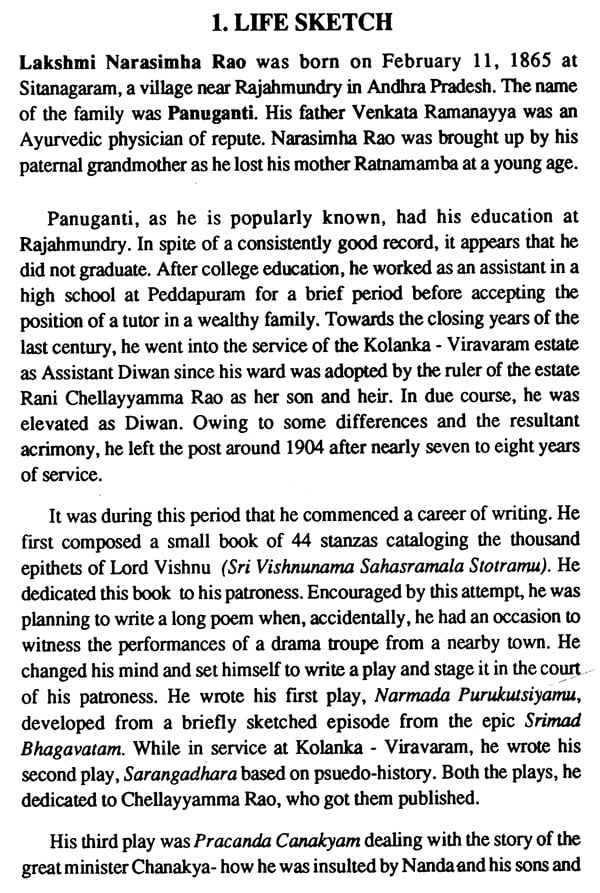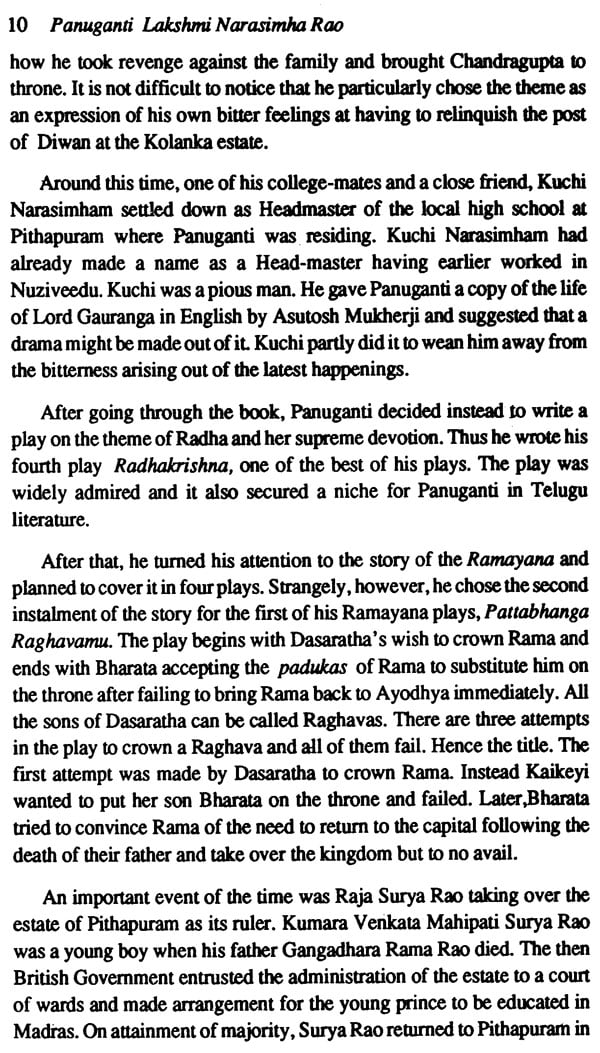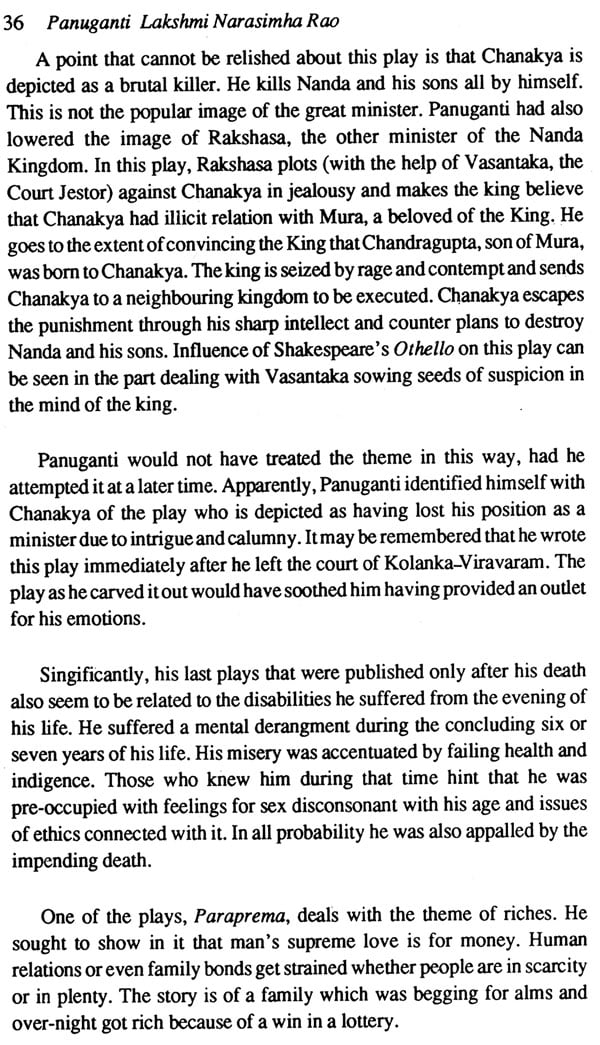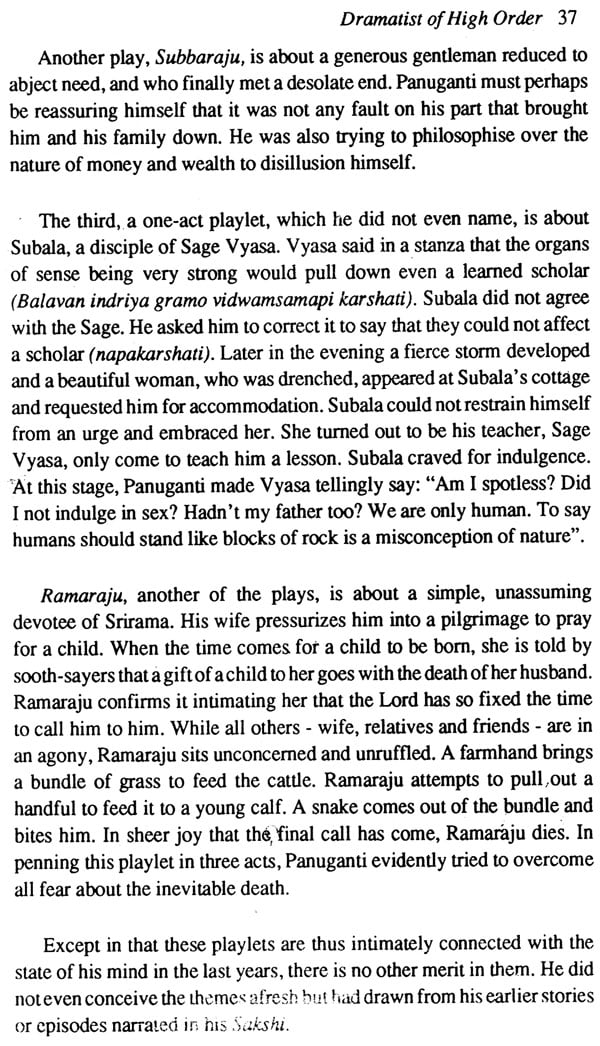
Panuganti Lakshmi Narasimha Roa(Makers of Indian Literature)
Book Specification
| Item Code: | NAR055 |
| Author: | Mudigonda Veerabhadra Sastry |
| Publisher: | SAHITYA AKADEMI, DELHI |
| Language: | English |
| Edition: | 1993 |
| ISBN: | 8172014996 |
| Pages: | 79 |
| Cover: | PAPERBACK |
| Other Details | 8.50 X 5.50 inch |
| Weight | 110 gm |
Book Description
Panuganti Lakshmi Narasimha Ran (1865 - 1940) Carved out a niche for himself in the portals of modem Telugu literature. He is as towering as a dramatist as he is unrivalled as an essayist. His contribution to Andhra literature, to say the least, is stupendous and outstanding. His writings disclose his originality, versatility spontaneity, energy and earnestness. He occupies not merely a high but a unique . place. His dramas are of a consistently high literary standard. At least half a dozen of them became raging success on the stage. His Sakshi essays are fall of wit and wisdom, bitter invective and biting sarcasm.
Mudigonda Veerabhadra Sastry author of this book got his doctoral degree for his critical study of the complete works of Panuganti Lakshmi Narasimha Rao. Has published many pieces of critical and creative writings in periodicals. Held various positions in Telugu Akademi, Institute of Telugu studies and Telugu University. He retired as the Director of Centre for the preparation of Encyclopaedia. In this slender volume, Dr. Sastry has presented the life and works of Panuganti Lakynni Narasimha Rao in a lucid manner for the benefit of non - Telugu readers.
Panuganti Lakshmi Narasimha Rao (1865-1940) was an eminent author of his time and commanded an over-whelming respect and admiration. He wrote mostly plays and essays. In his own assessment, he believed that he would be remembered as a playwright but ironically he came to be more cherished for Sakshi essays, which according to him were composed off-hand and with the least effort
In a way Panuganti was a conscious artist with his mind set on high values and achievements. He was, besides, an intellectual. Though any one can enjoy his play, it is only a discerning reader that can appreciate his consummate skill as a dramatist. On the other hand, his Sakshi essays, inspired by the Spectator essays of Addison and Steele, were intended for the common reader. Since they were aimed at moulding the individuals, he adopted in those essays a style that would immediately arrest and draw the attention of the reader - a verbose and rhetorical style steeped in rich humour and satire. It is no surprise, therefore, that the general readers found him more fascinating in his essays.
The period in which he lived and wrote is of considerable significance. Closer contact with the West through English had triggered off a new wave of renaissance and a spirit of rejuvenation in the Telugu region just like it did elsewhere in the country. A host of writers emerged from the new educated class and started a wide variety of experiments. It was also a period marked by a conflict of ideas and values often resulting in a confusion. Extreme views were held and advocated condemning the new or the old. The reaction to the overrunning Western thought and practice needs to be carefully examined in the context of the great movement of those years to achieve freedom from the foreign yoke, which significantly was the very source of the new wave.
Panuganti assumes importance as one who viewed and reviewed the contemporary scene in a clear, balanced and conscious way and kept himself above sentimental and emotional nonsense. He raised his manly voice above the din and ventilated his feelings never bothering for a moment how they would be received. Yet, he was sure of his success, and he succeeded because of his confidence in himself and his technique and skill.
Panuganti Lakshmi Narasimha Rao made a significant contribution to the modem Telugu literature as a dramatist, as an essayist and as a humourist. As an intellectual of a high order, he influenced a large section of the educated class in imbibing an unbiased and penetrating approach to life around.
Another feature that marks his writings is his diction and mode of expression. He developed a new style which is inimitable and as such to translate his work becomes a near impossibility. Though it secured him an assured place in the Telugu literature, it robbed him of his due place in Indian literature as a whole. However, an attempt, the first of its kind, to introduce him to a larger section across the country, which perhaps is overdue, is now being made. I thank the Sahitya Academy for giving me the opportunity.
**Contents and Sample Pages**









